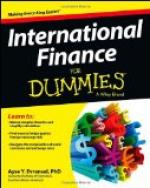Bonds are called bearer securities, that is to say, possession of them entitles the bearer to receive payment of them when drawn and to collect the coupons at their several dates. They are the usual form for the debts of foreign Governments and municipalities, and of foreign railway and industrial companies.
In England we chiefly affect what are called registered and inscribed stocks—that is, if our Government or one of our municipalities issues a loan, the subscribers have their names registered in a book by the debtor, or its banker, and merely hold a certificate which is a receipt, but the possession of which is not in itself evidence of ownership. There are no coupons, and the half-yearly interest is posted to stockholders, or to their bankers or to any one else to whom they may direct it to be sent. Consequently when the holder sells it is not enough for him to hand over his certificate, as is the case with a bearer security, but the stock has to be transferred into the name of the buyer in the register kept by the debtor, or by the bank which manages the business for it.
When the securities offered are not loans by public bodies, but represent an interest in a company formed to build a railway or carry on any industrial or agricultural or mining enterprise, the procedure will be on the same lines, except that the whole affair will be on a less exalted plane. Such an issue would not, save in exceptional circumstances, as when a great railway is offering bonds or debenture stock, be fathered by one of the leading financial firms. Industrial ventures are associated with so many risks that they are usually left to the smaller fry, and those who underwrite them expect higher rates of commission, while subscribers can only be tempted by anticipations of more mouth-filling rates of interest or profit. This distinction between interest and profit brings us to a further difference between the securities of companies and public bodies. Public bodies do not offer profit, but interest, and the distinction is very important. A Government asks for your money and promises to pay a rate for it, whether the object on which the money is spent be profit-earning or no, and, if it is, whether a profit be earned or no. A company asks subscribers to buy it up and become owners of it, taking its profits, that it expects to earn, and getting no return at all on their money if its business is unfortunate and the profits never make their appearance. Consequently the shareholders in a company run all the risks that industrial enterprise is heir to, and the return, if any, that comes into their pockets depends on the ability of the enterprise to earn profits over and above all that it has to pay for raw material, wages and other working expenses, all of which have to be met before the shareholder gets a penny.




